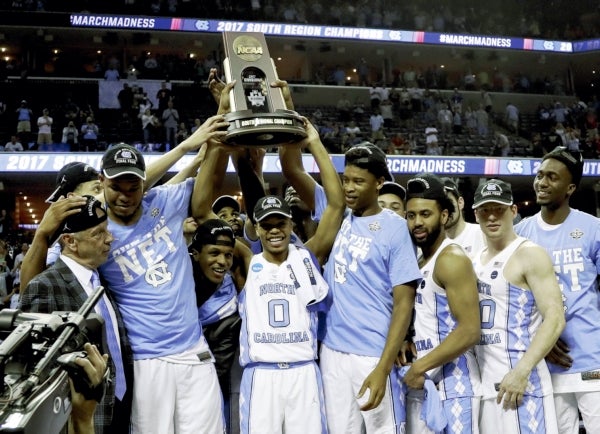Analysis: Maryland president ‘would think’ UNC gets death penalty. One would think he is out to lunch.
Published 12:17 am Wednesday, April 12, 2017

- North Carolina players and coaches celebrate after beating Kentucky 75-73 in the South Regional final game in the NCAA college basketball tournament Sunday, March 26, 2017, in Memphis, Tenn. (AP Photo/Mark Humphrey)
By Chuck Culpepper
Some 678 days have passed since the dead of the fourth day of June 2015, when the University of North Carolina released the 730-page Notice of Allegations with which the NCAA had greeted it 15 days prior. That news took the usual American stew of resentment, rationalization and fan tribalism and gave it a good, fresh frothing.
It has boiled only on occasion since, again on Monday evening, when the Raleigh News & Observer reported that Wallace Loh, the president of the University of Maryland, responded to a question from a faculty member in a university senate meeting last Thursday by guessing – “I would think” – the North Carolina academic scandal “would lead to the implementation of the death penalty by the NCAA.”
That was a guess, all right. It sounded like somebody out to lunch, dinner, drinks and then breakfast. The death penalty is not coming, and it’s uncertain, anyway, which North Carolina sports would receive it. That’s among the few certainties in the fake-classes scandal that sprouted in the African Studies curriculum in 1993, which remains an uncertainty heading for an uncertain conclusion at an uncertain time, even as it does appear to stand a very good chance of pleasing very few.
The North Carolina case has breathed on through fresh revelations and new extensions all the way to now. During the 678 days since the Notice of Allegations, the Tar Heels’ most visible property, the men’s basketball team, finished as the national runner-up (April 2016) and then the national champion (April 2017). While onlookers still await news of North Carolina’s appearance before the NCAA Committee on Infractions, there’s a chance, just a chance, that those inclined to dislike the Tar Heels, by heredity or otherwise, might remark forever about a peculiar little conditional:
Had the NCAA case progressed more swiftly, one or both of those tournaments might not have even invited North Carolina.
Loh, who attended Grinnell, Cornell, Michigan and Yale, as well as University of Leuven in Belgium (which has yet to reach a Final Four), presumably has none of the base biases, only a commendable wish that academics reign undiluted. That ideal, of course, would violate all known American college-sports values constructed since the 1800s.
According to a tape of the public meeting sent to the News & Observer, Loh answered a question thusly:
“As president I sit over a number of dormant volcanoes. One of them is an athletic scandal. It blows up, it blows up the university, its reputation. It blows up the president. For the things that happened at North Carolina, it’s abysmal. I would think that this would lead to the implementation of the death penalty by the NCAA. But I’m not in charge of that.”
Concerning that word “reputation,” we now have a protracted North Carolina scandal pitted against a fresh North Carolina national title, vying to see how they can affect the general North Carolina applications number. That figures to be a donnybrook.
Loh’s words might sound like manna to those hoping for light-blue bloodshed. Many of those sorts are merely tribal and not credible, but some actually crave honor. The whole lot of them, Loh included, cannot address the North Carolina case unless they grapple with a particular particular, and what it might mean within the NCAA rule book: The 3,100-odd students who got the fake courses, as outlined in the Wainstein Report of 2014, included in similar measure both athletes and plain old nonathletic students, crippling the notion that athletes received preferential treatment. It will be interesting to learn how the NCAA governs on that nutshell sometime within the next 678 days.

